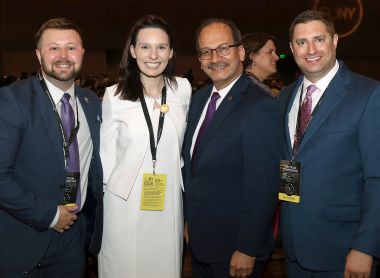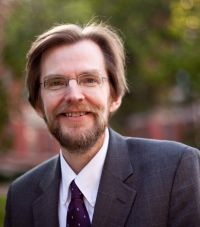Creating a Safe Space
 |
|
From left: Courtney D'Allaird, founding coordinator of GSRC; Elizabeth Brady, SUNY director of Sexual and Interpersonal Violence Prevention; UAlbany President Havidán Rodríguez and SUNY Associate Counsel Joseph Storch. (Photo by Joseph Putrock) |
ALBANY, N.Y. (June 27, 2018) – President Havidán Rodríguez convened a panel on inequities in the prevention of HIV and STIs and disparities in treatment at the SUNY SPECTRUM Conference last week.
The two-day conference brought together speakers and panels focused on creating a safe campus environment for LGBTQI+ students. More than 600 attended.
Rodríguez introduced School of Public Health Dean David Holtgrave, Johanne Morne, director of the NYS Department of Health AIDS Institute, and Perry Junjulas, executive director of the Albany Damien Center, Inc.
Holtgrave, who was a member and vice-chair of the Presidential Advisory Council on HIV/AIDS under former President Obama’s administration, has worked extensively in the field of HIV prevention.
The dean summarized data from the US Centers for Disease Control and Prevention (CDC) and noted that more than 1.1 million people in the U.S. are living with HIV today, but roughly 1 in 7 don’t know it.
Holtgrave further stated that, according to CDC about 70 percent of new cases of HIV and STI’s were among gay and bisexual men, even though new diagnoses dropped overall between 2011 and 2015 for many communities. HIV diagnoses actually increased among gay and bisexual Latino men and black men.
A lack of stable housing, food security, affordable and non-stigmatized health care fuel health care inequities in HIV, the dean said.
Social factors such as these are found to be associated with other diseases including diabetes and heart disease.
Johanne Morne said social scientists use the term “structural violence” to describe the situation when social and structural factors lead to health inequities or to basic service needs going unmet.
Morne provided an overview of initiatives to combat HIV/AIDS across New York State including the pioneering “End the Epidemic” initiative, which has the goal of significantly reducing HIV diagnoses by the end of 2020. She described examples of key actions taken to support access to prevention, health and support services, while working to reduce related stigma and discrimination. These actions aim to promote the elimination of identified social and structural barriers.
Junjulas said the focus has changed since he was diagnosed with HIV/AIDS in 1995 at age 29 and given three months to live. Today the emphasis is on teaching people how to live with HIV.
Junjulas said that housing is health care, and that we must go beyond just providing housing vouchers to unstably housed persons but also provide support services to help best take advantage of new housing opportunities.
Geography plays a role in who lives and who dies. The population rates of persons receiving an HIV diagnosis were highest in the South. “I’m alive today because I live in NYS and the Department of Health has programs,” Junjulas said. “With new medications you can live a long life and not pass AIDS to others.”
 |
|
School of Public Health Dean David Holtgrave has worked extensively in the field of HIV prevention. |
Additional Conference Speakers
Among the speakers at Tuesday’s portion of the conference were Antuan Raimone, a cast member of the hit musical “Hamilton.” Raimone stressed the importance of treatment for victims of child sexual abuse.
He said being sexually abused, first at age 7 and then at age 15, impeded his ability to form stable relationships until college friends referred him to the Crime Victims Treatment Center. “I am now much closer to peace,” he said.
Jane Clementi, founder of The Tyler Clementi Foundation, spoke about her son Tyler, who committed suicide in 2010 after his roommate surreptitiously filmed him having sex with another man and posted it on social media.
Speaking of her son, Clementi said, “He was so much more than the headlines.” He was a talented musician and a peacemaker, the youngest of her three sons.
Clementi’s son was a new freshman at Rutgers. Fall semester of freshman year can be an especially vulnerable time in a student’s life, she said.
She advocated for training other young people to speak up, to become “upstanders” instead of “bystanders” when they see someone being bullied.
UAlbany Involvement
UAlbany’s Courtney D’Allaird was involved in planning the SUNY-wide conference as a member of the Trans Student Impact Team. D’Allaird is the Assistant Director for Intercultural Student Engagement and the founding coordinator of the Gender and Sexuality Resource Center. At the conference, D’Allaird convened a workshop on the intersections of transgender rates of intimate violence and health disparities.
Making Campuses More Inclusive
Practical tips for making campuses more welcoming to LGBTQI+ students were raised at various workshops:
- Leaving space on an orientation name tag for a new student to add their pronouns, like “He, Him, His” or “They, Them, Theirs.” Respecting the flexibility of students to choose their own pronouns at any given time.
- Giving service credit toward tenure to faculty and staff who take LGBTQI+ training.
- Providing a map of gender-neutral bathrooms on campus.
- For the medical community, providing transgender-only hours for gynecological services, mammography and hormone therapy.
- Several schools reported having an LGBTQI+ Living Learning Community. The bill to parents for housing simply states “Living Learning Community,” so as not to inadvertently “out” a student.
![]() For more news, subscribe to UAlbany's RSS headline feeds
For more news, subscribe to UAlbany's RSS headline feeds
A comprehensive public research university, the University at Albany-SUNY offers more than 120 undergraduate majors and minors and 125 master's, doctoral and graduate certificate programs. UAlbany is a leader among all New York State colleges and universities in such diverse fields as atmospheric and environmental sciences, business, education, public health,health sciences, criminal justice, emergency preparedness, engineering and applied sciences, informatics, public administration, social welfare and sociology, taught by an extensive roster of faculty experts. It also offers expanded academic and research opportunities for students through an affiliation with Albany Law School. With a curriculum enhanced by 600 study-abroad opportunities, UAlbany launches great careers.


